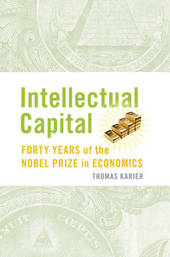
|
Intellectual Capital: Forty Years of the Nobel Prize in Economics
Paperback / softback
Main Details
| Title |
Intellectual Capital: Forty Years of the Nobel Prize in Economics
|
| Authors and Contributors |
By (author) Tom Karier
|
| Physical Properties |
| Format:Paperback / softback | | Pages:366 | | Dimensions(mm): Height 229,Width 152 |
|
| Category/Genre | Economic theory and philosophy
Political economy |
|---|
| ISBN/Barcode |
9781107507296
|
| Classifications | Dewey:330.0922 |
|---|
| Audience | | Professional & Vocational | | General | |
|---|
|
Publishing Details |
| Publisher |
Cambridge University Press
|
| Imprint |
Cambridge University Press
|
| Publication Date |
5 March 2015 |
| Publication Country |
United Kingdom
|
Description
There is arguably no award more recognized in the academic and professional worlds than the Nobel Prize. The public pays attention to the prizes in the fields of economics, literature, and peace because their recipients are identified with particular ideas, concepts, or actions that often resonate with or sometimes surprise a global audience. The Nobel Prize in Economic Science established by the Bank of Sweden in 1969 has been granted to 64 individuals. Thomas Karier explores the core ideas of the economic theorists whose work led to their being awarded the Nobel in its first forty years. He also discusses the assumptions and values that underlie their economic theories, revealing different and controversial features of the content and methods of the discipline. The Nobelists include Keynesians, monetarists, financial economists, behaviorists, historians, statisticians, mathematicians, game theorists, and other innovators.
Author Biography
Thomas Karier is a Professor of Economics and a former associate dean at Eastern Washington University, Cheney, Washington, where he began teaching in 1981. He is also a research associate of the Jerome Levy Economics Institute at Bard College, New York. Professor Karier is the author of numerous scholarly and professional publications and two books: Beyond Competition (1993) and Great Experiments in American Economic Policy (1997). The topics of his research have ranged from wage policies, international competition, research and development expenditures, and welfare reform to the economic contributions of John Kenneth Galbraith. Professor Karier has conducted policy analysis for the Economic Policy Institute in Washington, DC, and the Washington State Institute for Public Policy in Olympia, Washington. Thomas Karier was appointed by the past two governors of Washington to represent the state on the Northwest Power and Conservation Council, which coordinates electric power planning and fish and wildlife recovery in the northwestern United States. He has written on energy and natural resource economics for the leading Washington state newspapers and commented on these subjects in the national media. Professor Karier received his Ph.D. from the University of California, Berkeley in 1985.
Reviews'In the style of Robert Heilbroner's Worldly Philosophers, Thomas Karier offers us a perspective on modern economics. Whereas Heilbroner used the backdrop of the lives and accomplishments of the classical economists, Intellectual Capital uses the backdrop of the lives and accomplishments of the Nobel Prize winners. Karier thus gives an easy and lively introduction to a difficult subject: what is modern economics, and what motivates it. Nor is he lacking in strong opinions.' George A. Akerlof, Nobel Laureate in Economics 2001, University of California, Berkeley 'Excellent - well researched, well written in an interesting and accessible way, and spot on about different economists' underlying assumptions and values. It should have a broad audience within the profession, as well as among those who follow economics and think about the role of economics in everyday life. Lay readers will learn a great deal of economics through this book.' Clair Brown, University of California, Berkeley 'Tom Karier has written a stimulating, accessible, and objective account of the contributions of the economics Nobel laureates in relation to the main domains of investigation that have characterized postwar economics. The book offers an excellent review of past economics and clues regarding the future of economics.' John Davis, University of Amsterdam and Marquette University 'Even-handed, lively, and (surprisingly) compelling survey of the top, modern economists and the ideas they got right and wrong. Karier provides an accessible way to understand how economists are rewarded and given significant influence and power.' Teresa Ghilarducci, The New School
|